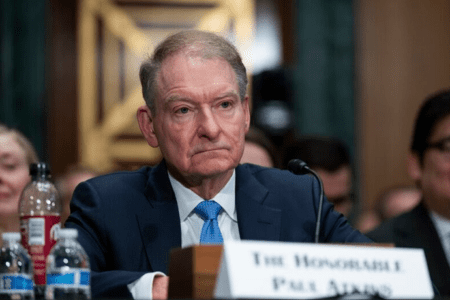In a seismic shift that’s rocking the financial world, the U.S. crypto industry is no longer playing defense—it’s launching an all-out offensive against the U.S. Securities and Exchange Commission (SEC), fueled by the Trump administration’s sudden crypto-friendly pivot. Just months into Donald Trump’s second term, the SEC has shockingly withdrawn its barrage of lawsuits against major players like Coinbase, Kraken, Gemini, and Uniswap Labs, signaling a dramatic retreat from the regulatory chokehold imposed under former Chair Gary Gensler’s Democrat-led regime. But is this newfound harmony a victory for innovation, or a cynical political maneuver that’s left taxpayers, entrepreneurs, and global markets reeling?
Out for Blood
The crypto industry, emboldened by Trump’s appointment of crypto advocate Paul Atkins as SEC chair and the creation of a flashy “AI and Crypto Czar” role for David Sacks, isn’t content with mere concessions. It’s out for blood.
On X, Cameron Winklevoss, co-founder of Gemini, unleashed a scathing tirade, publicly shaming the SEC and demanding “consequences” for the agency’s employees who, he claims, squandered “tens of millions” and “unquantifiable economic growth” through their relentless “regulation-by-enforcement” crusade. “How many years of innovation were kicked down the road at the expense of Americans?” Winklevoss roared, his words echoing across social media like a battle cry.
A Chief Legal Officer v SEC
Not to be outdone, Coinbase’s Chief Legal Officer Paul Grewal fired off his own salvo on X, accusing the SEC’s previous leadership of costing “Americans innovation, global leadership, and jobs.” In a bold move, Coinbase slapped the SEC with a Freedom of Information Act (FOIA) request, demanding transparency on the taxpayer dollars hemorrhaged in the agency’s “war on crypto.” The question hangs heavy in the air: How much did Gensler’s vendetta against digital assets drain from public coffers, and why should everyday Americans foot the bill for a political witch hunt?
A Political Counter-Strike?
This isn’t just a regulatory skirmish—it’s a full-blown cultural and economic reckoning, with politics at its rotten core. Under Gensler, the SEC treated crypto companies like public enemy number one, launching years-long investigations and lawsuits that paralyzed innovation and drove talent overseas. The web results paint a grim picture: the SEC’s retreat, as reported by WIRED and Blockonomi, is “unprecedented,” with critics like Anthony Scaramucci suggesting Trump’s alignment with crypto moguls is less about principle and more about political expediency. Meanwhile, Cornell professor Eswar Prasad warns that this “favorable” regulatory environment could supercharge crypto prices—like Bitcoin’s recent $100,000 surge—but at what cost to accountability and stability?
The irony is palpable. The same Trump administration that once vilified “elites” and “deep state” bureaucrats is now cozying up to crypto billionaires, handing them the keys to reshape financial regulation. Is this a triumph of free-market principles, or a cronyist power grab where political loyalty trumps (pun intended) public interest? The crypto industry’s newfound swagger—evidenced by Winklevoss’s demands for personal accountability and Coinbase’s FOIA gambit—raises uncomfortable questions: Should SEC employees face public shaming and financial penalties for following orders under a different political regime? Or is this just revenge dressed up as justice, fueled by a partisan pendulum swing?
Politics Should Stay Out of the Innovation Game
Innovation shouldn’t be a political football, yet here we are, watching the crypto industry exploit Trump’s crypto-friendly stance to settle old scores. The SEC’s about-face—dropping probes into Gemini after 699 days, as Blockonomi notes, and signaling a “cooperative approach” under acting Chair Mark Uyeda—feels less like a policy evolution and more like a capitulation to political pressure. But at what price? The global crypto market, already a Wild West of speculation, now risks becoming a playground for political favoritism, where regulatory clarity is sacrificed on the altar of Trump’s loyalty tests.
And what of the taxpayers Grewal invokes? The SEC’s war on crypto may have cost millions in legal fees and lost opportunities, but will Trump’s crypto bonanza deliver real economic growth, or just inflate asset bubbles for the wealthy few? The industry’s claims of “unquantifiable loss” ring hollow if they’re simply trading one form of regulatory overreach for another—except this time, it’s draped in the MAGA flag. As Bitcoin soars and Dogecoin dances to Elon Musk’s tune, the rest of us are left wondering: Is this innovation, or just another chapter in America’s endless culture war, where business and politics collide in a spectacular, costly mess?
The crypto industry’s fight against the SEC isn’t just a battle for survival—it’s a provocative indictment of how deeply politics poisons progress. If Trump’s reign truly ushers in a “conducive regulatory environment,” as PBS suggests, it better deliver more than just skyrocketing token prices for crypto whales. Otherwise, this could be remembered as the moment innovation was hijacked by political theater, leaving taxpayers, workers, and global leadership holding the bag.







